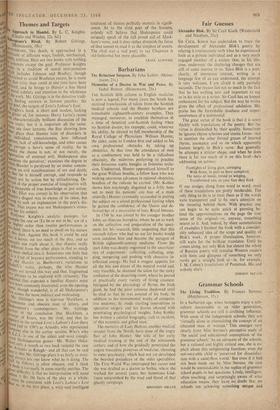Themes and Targets
Approach to Hamlet. By L. C. Knights. (Chatto and Windus, 12s. 6d.) "?sPeare's Rival. By Robert Gittings. (Heinemann, 18s.) ^ESPEARE, like death, is approached in a Multitude of different ways, foolish, mechanical, Sub,,tle, sublime. Here arc two books with nothing common except the goal. Professor Knights 'Fork,k in a tradition of moral interpretation 4441 includes Johnson and Bradley; though like rained to avoid Bradleian excess, he is more that critic than could at one time have been helfeved and he brings to Hamlet a fine blend moral subtlety and attention to the wholeness
t
iienh: work. Mr. Gittings is in the detective tradi- ! finding answers to famous puzzur les: the !Iva, Poet, the targets of Love's Labo's Lost. thi(tlights's book is short and modest, lacking andglitter of, for instance, Harry Levin's recent
characteristically brilliant discussion of the corie topic; but it is important all the same.
There are four lectures, the first showing how othe gle plays than Hamlet treat of disorders in Individual consciousness, how inflamed dt sill lack of self-knowledge, and other causes an awa corrupt a hero's sense of reality. So in r,/ 'el the theme is not, or not merely, the Nistration of external evil; Shakespeare also wqIliecitions the perceiver,' examines the degree to 11 Hamlet is paralysed by an undue concen- lrati3n on evil manifestations of sex and death, to that he is himself corrupt, and responds to Pri not by action but by attitudinising. De- iv W of the proper exercise of imaginative will, ; Incapable of true knowledge or just action. LI 4c. Eliot was correct in his observation that .iarro I, net's disgust was in excess of its cause, but 4re el to seek an explanation in the poet's dis- lant r. That excess was not Shakespeare's stimu- but his subject. Professor Knights's analytic passages. for tar raple the one on 'To be or not to be,' are of a ar higher order than routine performances in s field; this there is no need to dwell on his stature n )1s date. Against this book it could be said , it leaves out too much of the play, and so is d son 1e is one truth about it, that //ant/et really lierent from the other plays in that so much 4,as a is been stuffed into it. Sometimes one feels that the kind of bravura performance, standing to old Hamlet as Beethoven's variations to t11;ea, )elli's waltz. perhaps; the trite Hamlet intoles are turned this way and that, fragmented iitti phrases to be explored with virtuosity. The have ence that expected a familiar Hamlet must been constantly frustrated; even the opening Ile, though wonderful, is of all Shakespeare's 4stiseens the most indirect and misleading. IV Gittings's man is Gervase Markham, a v(illlIninous and obscure man of letters, and cspeare's contemporary. Mr. Gittings arhr;
les at the conclusion that Markham, a
0,0 of Essex, was the rival, and that he .0 Lal.S in the revised Love's Labour's Lost (here dated s date in 15971 as Armado, who represented
n
i-one else in the earlier version. Who's who ate-(it.L. is one of the oldest and most compli- 1ow Shakespearian games---Mr. Walter Oake- only a month or two back restated the case hate Arniado as Ralegh—and all that can be said that Mr. Gittings plays it as fairly as most. tr,iidlways lets one know what he is doing. The hr i he .follows is often obscure, and I think ttnds. it too easily in some marshy patches. The di.11iculty is that no interpretation will stand 1st:. it Ilk the facts of the play as a whole; as. he Consistent with Love's Labour's Lost ' in the first place, a witty -and intelligent treatment of themes perfectly exoteric in signifi- cance. As to the rival poet of the Sonnets, nobody will believe that Shakespeare could seriously speak of the full proud sail of Mark- ham's verse, and it does rather diminish the force of that sonnet to read it as the simplest of sneers. The rival was a real poet; to say Chapman is old-fashioned but more plausible.
FRANK KERMODE


























 Previous page
Previous page